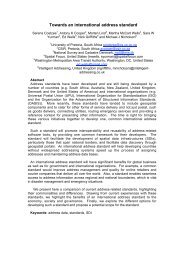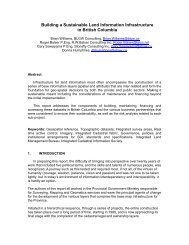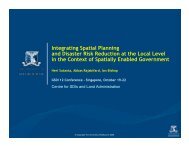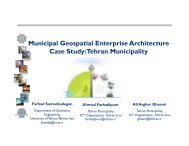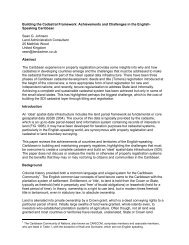SDI Convergence - Global Spatial Data Infrastructure Association
SDI Convergence - Global Spatial Data Infrastructure Association
SDI Convergence - Global Spatial Data Infrastructure Association
You also want an ePaper? Increase the reach of your titles
YUMPU automatically turns print PDFs into web optimized ePapers that Google loves.
5. DISCUSSION AND IMPLICATIONS FOR THEORY AND PRACTICE<br />
This analysis of local governments examined their capacity, characteristics and outcomes<br />
of the data sharing partnerships in the states of Queensland, Victoria and Tasmania.<br />
A number of significant trends and differences were identified amongst the variables<br />
and across the three states. The initial analysis of the questionnaire data has<br />
identified a number of important characteristics of local governments including their capacity<br />
across a number of the identified <strong>SDI</strong> component areas, existing preferences for<br />
collaboration and their level of satisfaction with the existing data sharing partnerships.<br />
The organisational analysis identified that the ICT capacity of LGAs was significantly<br />
better than expected and management support for GIS was generally satisfactory.<br />
Policies on access and pricing are not well developed in local government, as small<br />
staff numbers and other activities take priority. It is therefore important that state government<br />
agencies continue to lead and support LGAs to develop their policy frameworks.<br />
LGAs appear more likely to adopt or mimic the state government policies on access<br />
and pricing, although this has not been proven conclusively.<br />
The findings from the factor analysis underscore the key motivations for sharing of<br />
data, particularly at the local government level. LGAs are very tightly resourced and<br />
highly business driven. Therefore, the linkage of data sharing initiatives to the business<br />
processes of LGAs is more likely to result in more successful and sustainable outcomes.<br />
The research also indicates that policies at that state and local level should be<br />
aligned where possible to ensure that there is minimal conflict. Local governments are<br />
more likely to follow the lead of state agencies on policy development due to their limited<br />
capacity to develop their own specific spatial data access and pricing policies.<br />
Often, LGAs are at the cutting edge of spatial data access and provision through the<br />
use of the internet and web mapping. Because of the closeness of LGAs to their customers,<br />
they see immediate and significant benefits through providing information access<br />
to the local community. Information access facilitates better service and evidence<br />
indicates that it reduces the number of general enquiries. Organisational support and<br />
leadership were also rated highly and agree with previous theoretical and empirical research.<br />
Local government data is increasingly available over the web and indications are that it<br />
will be a strong driver for facilitating business and reducing the number of over-thecounter<br />
enquiries for LGAs. The level of completeness of core data sets was very high<br />
for most local governments which should provide an excellent basis for exchanging<br />
digital data. Standards and metadata were identified as issues that will continue to demand<br />
attention and strategies to improve compliance in these areas. Integration of data<br />
across the LGAs is well advanced, but full interoperability is still some way off.<br />
6. CONCLUSIONS<br />
<strong>Spatial</strong> data is widely utilised across all levels of government, business and the general<br />
community. The objectives of <strong>SDI</strong> initiatives are to create, maintain and disseminate<br />
spatial data for the benefit of society. However, the co-operation and exchange of information<br />
has continued to be problematic with detrimental impacts on government<br />
business and areas such as emergency services. This research has found that local<br />
governments have mature spatial data holdings and the ICT infrastructure to facilitate<br />
<strong>SDI</strong> development through the wider sharing of data.<br />
214



